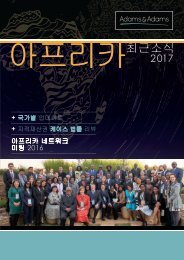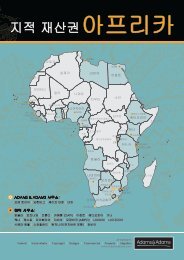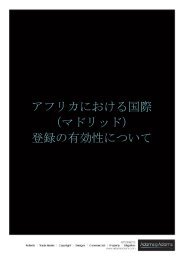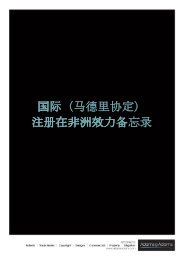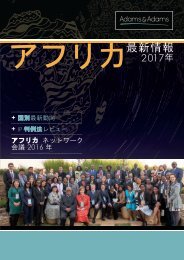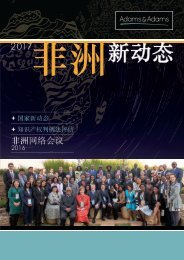Adams on Africa Issue 3
Adams & Adams. The Adams on Africa Newsletter is a quarterly publication at focuses on business and law in Africa
Adams & Adams. The Adams on Africa Newsletter is a quarterly publication at focuses on business and law in Africa
You also want an ePaper? Increase the reach of your titles
YUMPU automatically turns print PDFs into web optimized ePapers that Google loves.
IN THIS ISSUE<br />
NIGERIA vs SOUTH AFRICA<br />
An ec<strong>on</strong>omic grudge match?<br />
NAFDAC REGULATIONS<br />
OIL AND GAS ADDS TO<br />
GROWTH PROSPECTS<br />
WHEN<br />
COUNTERFEITING<br />
BECOMES LETHAL!<br />
GALLO IMAGES/GETTY IMAGES/ISTOCKPHOTO/ALAMY<br />
PLUS<br />
GETTING TO KNOW GHANA:<br />
THE PENDING PLANT BREEDERS’ BILL<br />
& COMPANY LAW<br />
ISSUE.03 SEPTEMBER 2017<br />
WEST AFRICA RISING: SENEGAL<br />
AND THE IVORY COAST
FROM THE<br />
EDITOR<br />
At the recent Singularity University Summit in<br />
Johannesburg, South <strong>Africa</strong>, Jas<strong>on</strong> Silva,<br />
the Emmy-nominated host from Nati<strong>on</strong>al<br />
Geographic, pointed out during his<br />
address that, “What I have noticed about <strong>Africa</strong> is<br />
that it is not waiting for some magical cookie cutter<br />
to come and save the c<strong>on</strong>tinent. No, rather using<br />
ideas such as Ubuntu, <strong>Africa</strong>ns have become some<br />
of the most forward-thinking people as innovati<strong>on</strong><br />
comes out of necessity”.<br />
As a leading <strong>Africa</strong>n law firm, with an expanding<br />
network <strong>on</strong> the c<strong>on</strong>tinent, we are witnessing,<br />
first-hand, the duality of various exp<strong>on</strong>ential<br />
technologies impacting the future of the regi<strong>on</strong>’s<br />
ec<strong>on</strong>omies – technologies such as Artificial<br />
Intelligence, robotics, cyber security, BlockChain,<br />
Fintech and Medtech – while governments deal<br />
with pressing development challenges through<br />
laws that can meaningfully influence ec<strong>on</strong>omic<br />
growth and the protecti<strong>on</strong> of rights such as<br />
intellectual property. We endeavour to report <strong>on</strong><br />
these and other developments, al<strong>on</strong>g with expert<br />
insight, through this publicati<strong>on</strong>, in the hope that it<br />
will assist you with your own brand and investment<br />
decisi<strong>on</strong>s in <strong>Africa</strong>.<br />
In this issue of <str<strong>on</strong>g>Adams</str<strong>on</strong>g> <strong>on</strong> <strong>Africa</strong>, we turn our<br />
attenti<strong>on</strong> to current ec<strong>on</strong>omic and legislative<br />
developments in Nigeria and Ghana, as well<br />
as Senegal and Côte d'Ivoire, two of the fastestgrowing<br />
markets <strong>on</strong> <strong>Africa</strong>’s west coast.<br />
Also in this issue, Victor Kgomoeswana, author<br />
of <strong>Africa</strong> is Open for Business, explores the tacit<br />
rivalry between Nigeria and South <strong>Africa</strong> in ‘Is<br />
Nigeria stealing the march <strong>on</strong> SA?’, while <str<strong>on</strong>g>Adams</str<strong>on</strong>g><br />
& <str<strong>on</strong>g>Adams</str<strong>on</strong>g> Associates, Tayyiba Nalla and Lisa van<br />
Zuydam, highlight the severe c<strong>on</strong>sequences of<br />
counterfeiting – especially FMCG counterfeiting –<br />
in <strong>Africa</strong>.<br />
We trust that you will enjoy reading this issue and<br />
we look forward to your feedback and suggesti<strong>on</strong>s.<br />
<str<strong>on</strong>g>Adams</str<strong>on</strong>g> <strong>on</strong> <strong>Africa</strong> | EDITORIAL TEAM<br />
SIDE NOTES | PRIDE<br />
OF AFRICA<br />
According to Forbes <strong>Africa</strong>,<br />
the current Top 10 list of the<br />
most ‘bankable’ musicians<br />
is dominated by southern<br />
and West <strong>Africa</strong>n artists:<br />
1. Ak<strong>on</strong> | Senegalese-American<br />
2. Black Coffee | South <strong>Africa</strong>n<br />
3. Hugh Masekela | South <strong>Africa</strong>n<br />
4. D<strong>on</strong> Jazzy | Nigerian<br />
5. Tinashe | Zimbabwe-American<br />
6. Jidenna | Nigerian-American<br />
7. WizKid | Nigerian<br />
8. Davido | Nigerian<br />
9. Sarkodie | Ghanaian<br />
10. Oliver Mtukudzi | Zimbabwean<br />
GHANAIAN-BORN<br />
EDWARD ENNINFUL<br />
WAS RECENTLY APPOINTED<br />
AS EDITOR-IN-CHIEF<br />
FOR BRITISH VOGUE.<br />
The stylist’s previous<br />
positi<strong>on</strong>s include Fashi<strong>on</strong><br />
Director at i-D, which<br />
garnered him the title<br />
of youngest fashi<strong>on</strong><br />
director ever for an<br />
internati<strong>on</strong>al publicati<strong>on</strong>. He holds an OBE<br />
(Officer of the Most Excellent Order of the British<br />
Empire), which was awarded in 2016 for his<br />
services to the fashi<strong>on</strong> industry.<br />
Associate Professor of Otolaryngology at Johns<br />
Hopkins, KOFI BOAHENE M.D., has published his<br />
fascinating story in his<br />
new memoir, However<br />
Far the Stream Flows<br />
(Platform Press). It tells<br />
the story of how, at age<br />
10, the Ghanaian-born<br />
Boahene stumbled up<strong>on</strong><br />
an encyclopedia entry<br />
about the founders of<br />
the Mayo Clinic in the<br />
‘very-far-away’ United<br />
States. This chance encounter sparked a desire<br />
in him to become a doctor. However, the road<br />
to fulfilling his dreams of studying and practising<br />
medicine was littered with challenges and<br />
heartache. It’s a powerful, inspirati<strong>on</strong>al read.<br />
GALLO IMAGES/GETTY IMAGES/ISTOCKPHOTO/ALAMY
IS NIGERIA<br />
STEALING THE<br />
MARCH ON SA?<br />
On the internati<strong>on</strong>al football stage, no victory is rarer<br />
or sweeter than when Bafana Bafana beat the Super<br />
Eagles. Somehow, this rivalry extends even further<br />
and, although South <strong>Africa</strong> has maintained the edge<br />
over its West <strong>Africa</strong>n counterpart, its place <strong>on</strong> <strong>Africa</strong>’s<br />
centre stage is certainly under scrutiny.<br />
Nigeria has often lagged behind South <strong>Africa</strong><br />
when it comes to infrastructure, security of power<br />
supply, internet penetrati<strong>on</strong>, soundness of the<br />
financial services sector, protecti<strong>on</strong> of minorities, rule<br />
of law and corrupti<strong>on</strong> percepti<strong>on</strong>. However, since<br />
1999, with South <strong>Africa</strong> riding the crest of “Madiba<br />
Magic”, Nigeria has maintained its upward trajectory.<br />
C<strong>on</strong>versely, South <strong>Africa</strong> has been losing some of<br />
its lustre and seems to be c<strong>on</strong>tinuing to do so. In<br />
fact, the last time South <strong>Africa</strong>’s credit rating was<br />
sub-investment grade (known as “junk status”), Mr<br />
Mandela was president. It has now come full circle in<br />
2017, as Nigeria, though still plagued by Boko Haram<br />
and sluggish ec<strong>on</strong>omic growth, has managed to hoist<br />
itself to the positi<strong>on</strong> of <strong>Africa</strong>’s largest ec<strong>on</strong>omy – with<br />
a much more respectable banking sector.<br />
The West <strong>Africa</strong>n giant smoothly managed the<br />
first change of political power from ruling party to<br />
oppositi<strong>on</strong>, when President Muhammadu Buhari’s<br />
APC w<strong>on</strong> at the 2015 polls. It has put a firm lid <strong>on</strong> 419<br />
scams, with nearly 20 Nigerian banks ranking in the<br />
world’s Top 1 000 Banks for the first time, according<br />
to Financial Times’ The Banker. <strong>Africa</strong>’s richest man,<br />
Aliko Dangote, is also Nigerian, and Nollywood is<br />
challenging both Bollywood and Hollywood. It’s far<br />
from perfect, but Nigeria has even started reversing its<br />
oil curse. The Nigerian Nati<strong>on</strong>al Petroleum Corporati<strong>on</strong><br />
is less tolerant of impropriety and has issued financial<br />
statements for the first time since 2009. In short, things<br />
are looking up.<br />
South <strong>Africa</strong>, in the meantime, has slid from<br />
its heyday of sovereign stability and, although still<br />
attracting a large chunk of foreign direct investment<br />
because of its protecti<strong>on</strong> of investors, sophisticated<br />
financial markets, a robust democracy and a str<strong>on</strong>g<br />
judiciary, the cracks in the ruling party are c<strong>on</strong>tinuously<br />
weakening the centre. Unless this downward trend<br />
is reversed, Nigeria will further entrench its positi<strong>on</strong><br />
as the gateway to West and Central <strong>Africa</strong> at least,<br />
while South <strong>Africa</strong> barely clings to some slivers of the<br />
Southern <strong>Africa</strong>n Development Corporati<strong>on</strong>.<br />
AFRO-OPTIMIST,<br />
VICTOR KGOMOESWANA, EXPLORES<br />
THE DIFFERENCES BETWEEN AFRICA’S<br />
POWERHOUSES.<br />
Victor Kgomoeswana is the author of <strong>Africa</strong> is Open for Business,<br />
a radio and TV commentator and a weekly columnist for the<br />
<strong>Africa</strong>n Independent and Sunday Independent newspapers<br />
in South <strong>Africa</strong>.<br />
BY THE NUMBERS | Nigeria vs South <strong>Africa</strong><br />
In terms of sheer size, there’s no c<strong>on</strong>test.<br />
Nigeria’s populati<strong>on</strong> of<br />
186 milli<strong>on</strong><br />
dwarfs South <strong>Africa</strong>’s 55 milli<strong>on</strong>.<br />
NIGERIA’S GDP AT<br />
US$481 billi<strong>on</strong><br />
surpassed that of South <strong>Africa</strong>,<br />
which now stands at US$315 billi<strong>on</strong>.<br />
Nigeria dominates in other stakes, too.<br />
It has a better ec<strong>on</strong>omic growth rate<br />
and a much healthier measure<br />
of inequality, with its Gini Co-efficient at<br />
42,95<br />
versus South <strong>Africa</strong>’s 63,38.
REGIONAL NEWS<br />
NIGERIA’S OIL AND GAS<br />
DOMINATION ADDS TO<br />
GROWTH PROSPECTS<br />
A recent PricewaterhouseCoopers (PwC)<br />
report suggests that by end-2019 Nigeria could<br />
assume the status of the largest producer<br />
of refined petroleum products in <strong>Africa</strong>. The<br />
projecti<strong>on</strong> sees Nigerian exports exceed<br />
300 000 bpd by 2019 – up 350% from 2016<br />
producti<strong>on</strong> of 65 000 bpd. In this scenario,<br />
Nigeria would become an internati<strong>on</strong>al trading<br />
hub similar to Australia, Russia, Europe, and<br />
the US Gulf Coast, while the entire West <strong>Africa</strong><br />
regi<strong>on</strong> becomes energy self-sufficient by 2019,<br />
thus eliminating the need to source refined oil<br />
products from the US and Europe.<br />
Despite dwindling crude oil sales to the<br />
west, West <strong>Africa</strong>n demand for Nigeria’s<br />
crude oil is set to rise dramatically. The regi<strong>on</strong><br />
annually c<strong>on</strong>sumes 22 billi<strong>on</strong> litres of petrol,<br />
and Nigeria’s domestic market accounts for 17<br />
billi<strong>on</strong> of those litres, yet the country still imports<br />
around 80% of this energy.<br />
NIGERIA MOVES TO IMPLEMENT<br />
PRODUCT AUTHENTICATION SCHEME<br />
The Standards Organisati<strong>on</strong> of Nigeria (SON) has<br />
engaged the services of the Nigerian affiliate of<br />
an internati<strong>on</strong>al security printing outfit, MSP Secure<br />
Technologies Nigeria Ltd to introduce a product<br />
authenticati<strong>on</strong> scheme in the country.<br />
The scheme is aimed at assisting c<strong>on</strong>sumers<br />
to determine the authenticity of products before<br />
purchase. Speaking at the signing of the agreement<br />
with the company in Abuja, newly appointed SON<br />
Director General, Osita Aboloma, stated that his<br />
management team was motivated to introduce<br />
the scheme to ensure c<strong>on</strong>sumers get value for their<br />
m<strong>on</strong>ey, while also protecting genuine manufacturers<br />
and importers from faking, cl<strong>on</strong>ing and product<br />
counterfeiting.<br />
Under the stewardship of the former DG, Paul<br />
Angya, the agency had doubled its efforts against<br />
sub-standard products <strong>on</strong> the market and made<br />
substantial progress in the implementati<strong>on</strong> of its<br />
programmes.<br />
EXPANDING INTO NIGERIA<br />
André Visser, Partner at <str<strong>on</strong>g>Adams</str<strong>on</strong>g> & <str<strong>on</strong>g>Adams</str<strong>on</strong>g>, says that<br />
despite penalties incurred by companies such as<br />
MTN, who operate in Nigeria, many South <strong>Africa</strong>n<br />
and internati<strong>on</strong>al companies c<strong>on</strong>tinue to recognise<br />
the value of expanding their operati<strong>on</strong>s to the West<br />
<strong>Africa</strong>n state.<br />
The primary forms of companies for foreign investors<br />
are:<br />
Public companies limited by shares<br />
Public unlimited companies<br />
Private companies limited by shares<br />
Private unlimited companies<br />
Guarantee (not-for-profit) companies<br />
There is a minimum of two shareholders needed<br />
for a private company limited by shares, and a<br />
maximum of 50. For foreign entities to trade in Nigeria,<br />
they need to incorporate a company, which is d<strong>on</strong>e<br />
by the Corporate Affairs Commissi<strong>on</strong> (CAC). Unlimited<br />
liability companies are formed for certain professi<strong>on</strong>s<br />
which are not permitted to have limited liability.<br />
The minimum share capital to incorporate a private<br />
limited liability company is about US$55. However,<br />
where foreigners will hold shares in the company,<br />
there is a minimum investment for a company to be<br />
eligible to apply for a business permit and expatriate<br />
quota approval, which is approximately US$55 000.<br />
Foreigners are allowed to wholly own companies, but<br />
certain legislati<strong>on</strong> stipulates participati<strong>on</strong> in sectors,<br />
such as oil, gas and inland water trading.<br />
For assistance in setting up companies in Nigeria,<br />
e-mail andre.visser@adamsadams.com<br />
GALLO IMAGES/GETTY IMAGES/ISTOCKPHOTO/ALAMY
GHANA PLANT BREEDERS’<br />
BILL STILL TO BE PASSED<br />
Although there have been<br />
developments in several jurisdicti<strong>on</strong>s<br />
with regard to plant breeders’ rights, the<br />
2013 Act for the Protecti<strong>on</strong> of Plant Breeders’ rights<br />
in Ghana remains pending. Meanwhile, the Director<br />
of the Crops Research Institute of The Council for<br />
Scientific and Industrial Research has bemoaned the<br />
c<strong>on</strong>tinued delay in passing the Plant Breeders' law.<br />
Dr Stella Aba Enning says a number of crop varieties<br />
developed in the country, such as maize, are being<br />
used by more than 15 <strong>Africa</strong>n countries free of charge<br />
because of the absence of the bill. The bill, which<br />
seeks to empower crop breeders to earn royalties, has<br />
been in Parliament for four years.<br />
For informati<strong>on</strong> <strong>on</strong> Plant Breeders' Rights in any <strong>Africa</strong>n<br />
country, e-mail Patents@adamsadams.com<br />
PATENT<br />
SUMMIT<br />
PATENT<br />
EXAMINATION<br />
SYSTEMS UNDER<br />
SPOTLIGHT<br />
AT SUMMIT<br />
Many <strong>Africa</strong>n countries do not currently c<strong>on</strong>duct any<br />
form of examinati<strong>on</strong> of patent applicati<strong>on</strong>s, but are<br />
c<strong>on</strong>sidering the opti<strong>on</strong>s in this regard. To this end, the<br />
European Patent Office (EPO) recently announced<br />
its co-sp<strong>on</strong>sorship of the c<strong>on</strong>tinent’s first Summit <strong>on</strong><br />
Patent Examinati<strong>on</strong> Systems in <strong>Africa</strong>, in partnership<br />
with <str<strong>on</strong>g>Adams</str<strong>on</strong>g> & <str<strong>on</strong>g>Adams</str<strong>on</strong>g>. The meeting will take place <strong>on</strong><br />
13 September 2017 in Pretoria, South <strong>Africa</strong>.<br />
IP Officials, Registrars and Director-Generals from<br />
nati<strong>on</strong>al and regi<strong>on</strong>al patent offices across <strong>Africa</strong><br />
have been invited to attend and discuss the various<br />
approaches to patent examinati<strong>on</strong> available and to<br />
gain insights into developments in this regard around<br />
the world.<br />
The Summit is followed by the 5 th Annual <str<strong>on</strong>g>Adams</str<strong>on</strong>g><br />
& <str<strong>on</strong>g>Adams</str<strong>on</strong>g> Network Meeting, a two-day seminar that<br />
brings together IP professi<strong>on</strong>als and officials from<br />
across the c<strong>on</strong>tinent to discuss topical IP issues in an<br />
<strong>Africa</strong>n c<strong>on</strong>text.<br />
Summit & Network Meeting queries may be directed<br />
to <strong>Africa</strong> Practice Manager at <str<strong>on</strong>g>Adams</str<strong>on</strong>g> & <str<strong>on</strong>g>Adams</str<strong>on</strong>g>, Mr<br />
Menzi Maboyi [menzi.maboyi@adamsadams.com]<br />
MADRID PROTOCOL SEMINAR<br />
HELD IN GHANA<br />
The Registrar-General’s Department organised a<br />
seminar at which officials from WIPO were invited to<br />
provide greater clarity <strong>on</strong> the operati<strong>on</strong> of trademark<br />
applicati<strong>on</strong>s under the Madrid Protocol. We c<strong>on</strong>tinue<br />
to advise clients to exercise cauti<strong>on</strong> in using the<br />
Madrid Protocol in certain <strong>Africa</strong>n countries until their<br />
nati<strong>on</strong>al laws recognise Madrid registrati<strong>on</strong>s and until<br />
the nati<strong>on</strong>al IP offices are enabled to deal with new<br />
applicati<strong>on</strong>s, in line with the framework of the Madrid<br />
Protocol.<br />
Click here for the updated Madrid Report by A&A<br />
EXPANDING INTO GHANA<br />
There are three forms of companies comm<strong>on</strong>ly<br />
used by foreign investors, namely; Company<br />
limited by shares, Company limited by<br />
guarantee, and Unlimited liability company.<br />
FOREIGN INVESTMENT<br />
Foreigners intending to invest in Ghana are<br />
required to register with the Ghana Investment<br />
Promoti<strong>on</strong> Centre (GIPC). Registrati<strong>on</strong> ensures<br />
that the company has complied with various<br />
mandatory legal requirements in respect of laws<br />
pertaining to foreign investment in Ghana.<br />
SHARE CAPITAL<br />
If the company is wholly foreign-owned, the<br />
minimum equity capital investment required<br />
is US$300 000. A n<strong>on</strong>-trading company which<br />
is wholly foreign-owned requires a minimum<br />
equity capital investment of US$50 000. A joint<br />
venture with a Ghanaian nati<strong>on</strong>al requires a<br />
minimum equity capital of U$10 000.<br />
For assistance in setting up companies in<br />
Ghana, andre.visser@adamsadams.com
REAPING REWARDS IN AFRICA<br />
CÔTE D’IVOIRE AND SENEGAL<br />
Stephen Hollis [Partner] and Lebohang Mosala [Associate] offer insight<br />
into two of the fastest-growing ec<strong>on</strong>omies <strong>on</strong> the <strong>Africa</strong>n west coast.<br />
CÔTE D'IVOIRE<br />
Following a decade of political turmoil and<br />
incidents of civil c<strong>on</strong>flict and war, business<br />
has been booming in this West <strong>Africa</strong>n country in<br />
recent years. The Internati<strong>on</strong>al M<strong>on</strong>etary Fund found<br />
that the Côte d'Ivoire was the fastest-growing<br />
<strong>Africa</strong>n ec<strong>on</strong>omy in 2016 (with a growth<br />
rate of 8,7%, versus the average growth<br />
rate of around 3% of sub-Saharan countries).<br />
The headquarters of the <strong>Africa</strong>n Development<br />
Bank relocated from Tunisia to Abidjan in 2014, in<br />
recogniti<strong>on</strong> of business opportunities. The outlook<br />
remains positive for the Côte d’Ivoire to have<br />
another good financial year as far as c<strong>on</strong>tinued<br />
ec<strong>on</strong>omic growth is c<strong>on</strong>cerned, especially in its<br />
established agricultural and rapidly developing<br />
energy sectors.<br />
The Côte d'Ivoire is a member country of the<br />
<strong>Africa</strong>n Intellectual Property Organisati<strong>on</strong> (OAPI).<br />
CHALLENGES TO GROWTH<br />
More than half of the country’s populati<strong>on</strong> still<br />
lives in poverty, according to the World Bank, and<br />
there remains large-scale civil unrest and c<strong>on</strong>cerns<br />
about stability and security in the country. These<br />
c<strong>on</strong>cerning developments could have a negative<br />
impact <strong>on</strong> the country’s ec<strong>on</strong>omic growth outlook<br />
as new incidents of civil unrest and violent c<strong>on</strong>flict<br />
would certainly stem the influx of direct foreign<br />
investment that’s been a result of the recent years<br />
of peace and stability.<br />
Senegal is c<strong>on</strong>sidered to be <strong>on</strong>e of the most<br />
politically stable countries in <strong>Africa</strong>, with three<br />
peaceful political transiti<strong>on</strong>s and four presidents<br />
since its independence from France in 1960.<br />
Senegal has experienced a 6,6% ec<strong>on</strong>omic<br />
growth rate over the past two years,<br />
due mainly to thriving fishing and agricultural<br />
sectors. The country is the sec<strong>on</strong>d-fastest-growing<br />
ec<strong>on</strong>omy in West <strong>Africa</strong> behind Côte d’Ivoire,<br />
and the fourth-fastest in sub-Saharan <strong>Africa</strong>.<br />
In April 2017 an Appeals Court in Senegal upheld<br />
a life impris<strong>on</strong>ment sentence handed down<br />
by “The Extraordinary <strong>Africa</strong>n Chamber”. This is<br />
a tribunal established under an agreement<br />
between the <strong>Africa</strong>n Uni<strong>on</strong> and Senegal to<br />
adjudicate internati<strong>on</strong>al criminal cases for human<br />
rights violati<strong>on</strong>s committed in Chad by Hissene<br />
Habre, the former head of state.<br />
CHALLENGES TO GROWTH<br />
The implementati<strong>on</strong> of the PSE (Plan Senegal<br />
Emergent), a reforms and public investment<br />
programme remains the main challenge. Its structural<br />
impact might be lower than expected, or delayed<br />
by technical restricti<strong>on</strong>s or other evolving priorities.<br />
Volatility in agriculture, dependent <strong>on</strong> climate, may<br />
affect growth too. Global oil and food prices could<br />
recover more rapidly, putting pressure <strong>on</strong> Senegal’s<br />
external balance sheet. FMCG counterfeits are<br />
also having a significant and negative impact <strong>on</strong><br />
ec<strong>on</strong>omic growth and public health in Senegal.<br />
SENEGAL<br />
The selling of fake FMCG goods and counterfeit<br />
medicines, which is a violati<strong>on</strong> of Intellectual<br />
Property laws, is also an <strong>on</strong>going problem.
CONSUMER PROTECTION<br />
FOR NIGERIA’S MIDDLE CLASS<br />
EXPORTING TO NIGERIA? NOT WITHOUT NAFDAC APPROVAL,<br />
SAYS PARTNER LINDIE SERRURIER.<br />
GALLO IMAGES/GETTY IMAGES/ISTOCKPHOTO/ALAMY<br />
Nigeria is <strong>Africa</strong>’s largest ec<strong>on</strong>omy. With a populati<strong>on</strong> of<br />
almost 190 milli<strong>on</strong> people, and a middle class that grew<br />
600% between 2000 and 2014, it is predicted that, by 2030,<br />
the West <strong>Africa</strong>n nati<strong>on</strong> will be home to around 12 milli<strong>on</strong> middleclass<br />
households.<br />
The ever-increasing demand for ‘luxury’ goods, together<br />
with the country’s ec<strong>on</strong>omic strategy to diversify its ec<strong>on</strong>omy<br />
from purely an oil-driven <strong>on</strong>e to developing alternative sectors<br />
including agriculture, infrastructure and manufacturing, has<br />
made the country an appealing market for internati<strong>on</strong>al<br />
businesses, as well as criminal organisati<strong>on</strong>s.<br />
As c<strong>on</strong>sumer exposure to global brands has increased, the<br />
increase in imports has brought with it a plague of illicit and<br />
counterfeit products. In an attempt to stem the flow of fakes,<br />
the Nigerian government created the Nati<strong>on</strong>al Agency for Food<br />
and Drug Administrati<strong>on</strong> and C<strong>on</strong>trol (NAFDAC) to tackle the<br />
problem and to safeguard c<strong>on</strong>sumer interests and welfare.<br />
The agency is tasked with c<strong>on</strong>trolling and regulating<br />
the quality of certain products prior to them being sold or<br />
manufactured in Nigeria. Its mandate covers food and food<br />
products, drugs and drug products, cosmetics, medical devices<br />
and chemicals, am<strong>on</strong>gst others. In order for importers and<br />
manufacturers to sell their wares in the country they must have<br />
NAFDAC approval.<br />
Any party interested in seeking to import or manufacture<br />
and sell products falling within the ambit of NAFDAC, must<br />
ensure that they acquire the necessary trade<br />
mark protecti<strong>on</strong> and register their products<br />
with the agency. The applicati<strong>on</strong> process is<br />
very stringent and can <strong>on</strong>ly be carried out by<br />
a Nigeria-registered company. No less than<br />
three different trade and product certificates<br />
are required, including documentati<strong>on</strong><br />
relating to registered trade marks, powers<br />
of attorney and business registrati<strong>on</strong>.<br />
This applicati<strong>on</strong> process varies from<br />
product to product. Although arduous and time<br />
c<strong>on</strong>suming (it can take up to 12 m<strong>on</strong>ths), the Nigerian<br />
government regards this process as vital if companies want<br />
to operate in the most populous nati<strong>on</strong> <strong>on</strong> the c<strong>on</strong>tinent and<br />
create a foothold in this rapidly-evolving ec<strong>on</strong>omy.<br />
In a recent show of the government’s drive to clamp down <strong>on</strong><br />
counterfeiters, the acting Director-General for NAFDAC issued a<br />
statement c<strong>on</strong>firming the submissi<strong>on</strong> of a new Bill to the Nati<strong>on</strong>al<br />
Assembly which seeks to introduce a punishment in the form of<br />
a life sentence for any<strong>on</strong>e found guilty of drug counterfeiting.<br />
In order for importers and<br />
manufacturers to sell their<br />
wares in the country, they must<br />
have NAFDAC approval.<br />
The following products cannot be<br />
sold without NAFDAC approval:<br />
Food and food products<br />
Drugs and drug products<br />
Cosmetics<br />
Medical devices<br />
Chemicals<br />
Veterinary products<br />
Biological products<br />
Herbal products, including<br />
herbal medicines.<br />
For more informati<strong>on</strong> <strong>on</strong> these<br />
regulati<strong>on</strong>s please visit<br />
www.nafdac.gov.ng or c<strong>on</strong>tact<br />
Nigeria@adamsadams.com for help<br />
with trade mark applicati<strong>on</strong>s and<br />
NAFDAC approval in Nigeria.
WHEN COUNTERFEITING<br />
Counterfeiting generally affects<br />
luxury goods; but now a new and<br />
worrying trend of counterfeiting<br />
in ‘fast moving c<strong>on</strong>sumer goods’<br />
(FMCG) is gripping markets in almost<br />
every <strong>Africa</strong>n jurisdicti<strong>on</strong>. <str<strong>on</strong>g>Adams</str<strong>on</strong>g> &<br />
<str<strong>on</strong>g>Adams</str<strong>on</strong>g> Associates, Lisa van Zuydam<br />
and Tayyiba Nalla, investigate the<br />
scourge in West <strong>Africa</strong>.<br />
FMCGs are goods that are sold quickly and at a<br />
relatively low wholesale or retail price. Some 20%<br />
of the most counterfeited brands in the world are<br />
FMCG brands. However they are distributed, FMCG<br />
fakes follow the same sales channels as legitimate<br />
FMCGs and so they move quickly.<br />
Generally, by the time a raid or visit is arranged, the<br />
goods have been sold or dispatched. The abundance<br />
of counterfeiters ranges from large wholesalers and<br />
retailers to street vendors.<br />
“The emergence of FMCG counterfeiting leaves<br />
our clients with a legal c<strong>on</strong>undrum,” explains Tayyiba<br />
Nalla, Associate at <str<strong>on</strong>g>Adams</str<strong>on</strong>g> & <str<strong>on</strong>g>Adams</str<strong>on</strong>g>. “We’ve had<br />
to help authorities develop new approaches to our<br />
traditi<strong>on</strong>al anti-counterfeiting methods – including a<br />
tiered approach that requires a combinati<strong>on</strong> of ‘soft’<br />
measures before we carry out raids.”<br />
Other strategies would include the facilitati<strong>on</strong> of<br />
customs educati<strong>on</strong>, regular amendments to<br />
packaging, as well as innovative packaging soluti<strong>on</strong>s<br />
such as QR codes and holograms.<br />
THE NIGERIAN RESPONSE<br />
Am<strong>on</strong>g the countries worst hit by counterfeit<br />
goods is Nigeria. <strong>Africa</strong>’s largest c<strong>on</strong>sumer<br />
market is home to 745 000 small and informal<br />
traders, according to Nielsen ratings.<br />
This counterfeiting menace came to the fore<br />
again recently when the Standards Organisati<strong>on</strong> of<br />
Nigeria (SON), through a whistleblower, discovered a<br />
warehouse in Satellite Town Lagos where two Chinese<br />
citizens were in the process of re-branding used or<br />
sub-standard tyres. With the help of local Nigerians,<br />
the criminals succeeded in bringing the tyres into<br />
Nigeria, and also secured a ‘safe place’ where<br />
GALLO IMAGES/GETTY IMAGES/ISTOCKPHOTO/ALAMY
COSTS LIVES<br />
they were carrying out their nefarious activities. This<br />
practice puts lives at risk. Innocent customers would<br />
have purchased the tyres in the hope that they were<br />
good for use as brand new products.<br />
In Nigeria, the Nati<strong>on</strong>al Agency for Food and Drug<br />
Administrati<strong>on</strong> and C<strong>on</strong>trol Act (NAFDAC) was created<br />
to regulate and c<strong>on</strong>trol, inter alia, the manufacture,<br />
importati<strong>on</strong>, exportati<strong>on</strong>, advertisement and sale of,<br />
am<strong>on</strong>g others, food, drugs, cosmetics, chemicals and<br />
packaged water. These products must be registered<br />
with NAFDAC before being traded. In Nigeria, NAFDAC<br />
routinely issues directives and warnings regarding<br />
products which may be harmful, are not registered or<br />
do not meet the specific product guidelines.<br />
In focus at present is salt and specifically the<br />
practice, against regulati<strong>on</strong>s, of packaging industrial<br />
salt in sizes such as 5kg, 10kg, 15kg and 20kg packs<br />
when it is <strong>on</strong>ly permitted to be sold in packages of<br />
50kg. This is to avoid c<strong>on</strong>fusi<strong>on</strong> am<strong>on</strong>g c<strong>on</strong>sumers<br />
between industrial salt and iodised table salt.<br />
Another c<strong>on</strong>cern in Nigeria is the volume and<br />
number of counterfeit food and drugs. In this regard,<br />
NAFDAC is involved in c<strong>on</strong>ducting raids <strong>on</strong> a regular<br />
basis, including recent raids <strong>on</strong> several shops at<br />
Ogbaru Relief Market in Onitsha which found that<br />
shops were producing, selling and distributing fake<br />
alcoholic and n<strong>on</strong>-alcoholic drinks.<br />
DANGER SIGNS<br />
The United Nati<strong>on</strong>s Office <strong>on</strong> Drugs<br />
and Crime (UNODC) estimates that globally<br />
the counterfeit business is in excess of<br />
$250 billi<strong>on</strong> a year and hundreds of billi<strong>on</strong>s<br />
more if pirated digital products and<br />
domestic counterfeit sales are included.<br />
MADE IN CHINA<br />
A massive 63.2% of knockoffs originate<br />
from China, and American brands<br />
are the most counterfeited.
FIGHTING BACK<br />
In South <strong>Africa</strong> al<strong>on</strong>e, an average<br />
of three raids are carried out per day<br />
in the fight against counterfeiting.<br />
SYNDICATES<br />
Counterfeiting has become<br />
as profitable as trading drugs and illegal<br />
narcotics and is a lot less risky.<br />
DEADLY FAKES<br />
A report by the World Health<br />
Organisati<strong>on</strong> (WHO) indicates<br />
that nearly a quarter of pharmaceuticals<br />
in circulati<strong>on</strong> in developing countries –<br />
including HIV/Aids, TB<br />
and malaria treatments –<br />
are of a poor and unacceptable<br />
quality. Such medicati<strong>on</strong> is at best<br />
ineffective and at worst deadly.<br />
For more info <strong>on</strong> <str<strong>on</strong>g>Adams</str<strong>on</strong>g> & <str<strong>on</strong>g>Adams</str<strong>on</strong>g>’<br />
Anti-counterfeiting unit, c<strong>on</strong>tact<br />
Godfrey.Budeli@adamsadams.com<br />
GHANA IN DISTRESS<br />
The Ghana Employers Associati<strong>on</strong> (GEA) says<br />
counterfeit goods are destroying indigenous<br />
Ghanaian companies. For instance, the textile<br />
industry, which used to employ more than<br />
30 000 people, now employs about 3 000,<br />
according to Alex Frimp<strong>on</strong>g, CEO of GEA in an<br />
interview with the Daily Graphic.<br />
In Ghana, the Food and Drugs Authority (FDA)<br />
is tasked with regulating and creating guidelines<br />
<strong>on</strong> the advertising and labelling of, inter alia, all<br />
processed food packaged for sale, medicines and<br />
medical devices, tobacco, herbal products and food<br />
supplements, cosmetics and household chemicals. It<br />
also develops guidelines for and regulates premises<br />
such as restaurants. Products and premises must be<br />
registered with the FDA.<br />
We’ve had to help authorities<br />
develop new approaches<br />
to our traditi<strong>on</strong>al anticounterfeiting<br />
methods –<br />
including a tiered approach<br />
that requires a combinati<strong>on</strong><br />
of ‘soft’ measures before we<br />
carry out raids.<br />
Last year, a video <strong>on</strong> social media showing an<br />
energy drink that had seemingly been labelled as<br />
the special Christmas editi<strong>on</strong> of the 250ml Blue Jeans<br />
Energy Drink – but the label for which could easily<br />
be pulled off to reveal another product – went viral<br />
in Ghana. Following the release of the video, the<br />
FDA launched investigati<strong>on</strong>s into the seemingly<br />
fake products and issued a directive ordering: “The<br />
cessati<strong>on</strong> of the distributi<strong>on</strong> and sale of all Blue Jeans<br />
Energy Drinks; total recall from trade of the special<br />
Christmas c<strong>on</strong>signment of Blue Jeans Energy Drinks<br />
with labels bearing Santa Claus (Father Christmas),<br />
and submissi<strong>on</strong> of all relevant documents for its<br />
examinati<strong>on</strong>.”<br />
The FDA also c<strong>on</strong>ducted market investigati<strong>on</strong>s last<br />
year and released statements to the public warning<br />
about fake olive oils, the dangers of use of certain<br />
skin lightening creams, LDC (a claimed medicinal<br />
preparati<strong>on</strong> for oral hygiene) and fake tomato<br />
powders found in the market.<br />
SOURCES: FINANCIAL MAIL, JUNE 2015; THE GUARDIAN, MARCH 2017; WWW.TODAYGHANANEWS.COM, APRIL 2015; GRAPHIC ONLINE.COM, AUGUST 2016; WWW.GHANADOT.COM, MARCH 2016.
PROOF | THE LION’S SHARE<br />
Nobody files more patents, trade marks<br />
and designs in <strong>Africa</strong> than us<br />
While bigger isn’t always better, in the case of filing<br />
and portfolio management, our ec<strong>on</strong>omies of scale<br />
in different territories across the c<strong>on</strong>tinent ensure that<br />
we build excellent and beneficial relati<strong>on</strong>ships with<br />
Registrars – but we never let scale compromise the<br />
quality of our service offering.<br />
FIRM<br />
2016<br />
OF<br />
THE<br />
YEAR<br />
AFRICA FIRM OF THE YEAR<br />
2015 | 2016 | 2017<br />
ATTORNEYS<br />
Patents | Trade Marks | Copyright | Designs | Commercial | Property | Litigati<strong>on</strong><br />
www.adamsadams.com
PRETORIA OFFICE<br />
Lynnwood Bridge, 4 Daventry Street,<br />
Lynnwood Manor, Pretoria, South <strong>Africa</strong><br />
PO BOX 1014, Pretoria 0001, South <strong>Africa</strong><br />
PHONE +27 12 432 6000<br />
FAX +27 12 432 6599<br />
EMAIL mail@adamsadams.com<br />
JOHANNESBURG OFFICE<br />
2 nd Floor, 34 Fredman Drive<br />
(Cnr. 5 th Street), Sandt<strong>on</strong>, South <strong>Africa</strong><br />
PO BOX 10155, Johannesburg 2000, South <strong>Africa</strong><br />
PHONE +27 11 895 1000<br />
FAX +27 11 784 2888 (CPL)<br />
+27 11 784 2872 (Patents)<br />
+27 11 784 2889 (Trade Marks)<br />
EMAIL jhb@adamsadams.com<br />
CAPE TOWN OFFICE<br />
28 th Floor, 1 Thibault Square,<br />
Cnr. L<strong>on</strong>g Street and Hans Strijdom Avenue,<br />
Cape Town, South <strong>Africa</strong><br />
PO BOX 1513, Cape Town 8000, South <strong>Africa</strong><br />
PHONE +27 21 402 5000<br />
FAX +27 21 418 9216 (Patents)<br />
+27 21 419 5729 (Trade Marks)<br />
EMAIL cpt@adamsadams.com<br />
DURBAN OFFICE<br />
Suite 2, Level 3, Ridgeside Office Park,<br />
21 Richef<strong>on</strong>d Circle, Umhlanga Ridge,<br />
Durban, South <strong>Africa</strong><br />
PO BOX 237, Umhlanga Rocks 4320, South <strong>Africa</strong><br />
PHONE +27 31 536 3740<br />
FAX +27 31 536 8254<br />
EMAIL dbn@adamsadams.com<br />
ASSOCIATE OFFICES:<br />
ANGOLA<br />
angola@adamsadams.com<br />
BOTSWANA<br />
botswana@adamsadams.com<br />
BURUNDI<br />
burundi@adamsadams.com<br />
CAMEROON (OAPI)<br />
camero<strong>on</strong>@adamsadams.com<br />
oapi@adamsadams.com<br />
EGYPT<br />
egypt@adamsadams.com<br />
ETHIOPIA<br />
ethiopia@adamsadams.com<br />
GHANA<br />
ghana@adamsadams.com<br />
KENYA<br />
kenya@adamsadams.com<br />
LESOTHO<br />
lesotho@adamsadams.com<br />
LIBERIA<br />
liberia@adamsadams.com<br />
LIBYA<br />
libya@adamsadams.com<br />
MOZAMBIQUE (ARIPO)<br />
aripo@adamsadams.com<br />
maputo@adamsadams.com<br />
NAMIBIA<br />
namibia@adamsadams.com<br />
NIGERIA<br />
nigeria@adamsadams.com<br />
SIERRA LEONE<br />
sierrale<strong>on</strong>e@adamsadams.com<br />
SWAZILAND<br />
swaziland@adamsadams.com<br />
TANZANIA (including Zanzibar)<br />
tanzania@adamsadams.com<br />
THE GAMBIA<br />
thegambia@adamsadams.com<br />
ZIMBABWE<br />
zimbabwe@adamsadams.com<br />
ATTORNEYS<br />
Patents | Trade Marks | Copyright | Designs | Commercial | Property | Litigati<strong>on</strong><br />
www.adamsadams.com


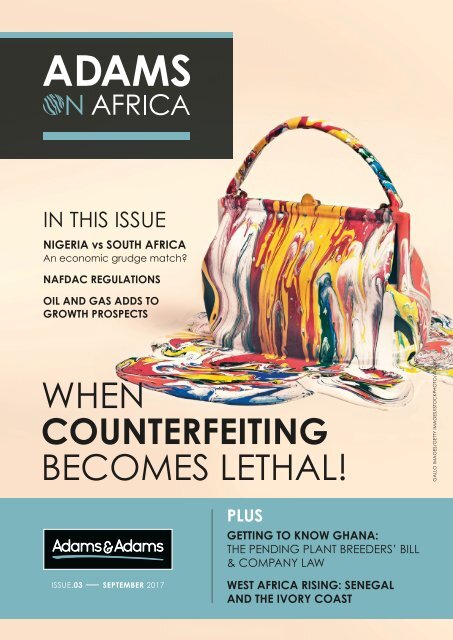




![Adams on Africa [Africa Update] Q3 2018](https://img.yumpu.com/61997083/1/184x260/adams-on-africa-africa-update-q3-2018.jpg?quality=85)
